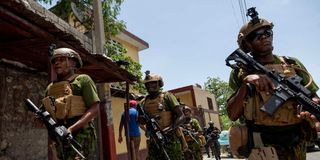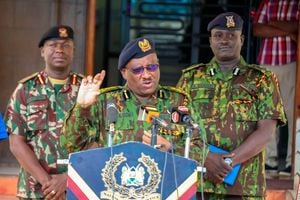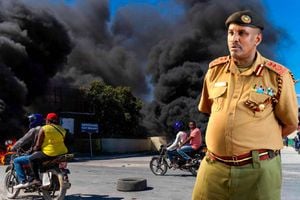
Kenyan police and Haitian National Police SWAT units patrol streets in Port-au-Prince, Haiti on June 28, 2024.
Kenya is asking for an urgent flow of money and other resources to bolster the Multinational Security Support (MSS) mission it is leading in Haiti while seeking a freeze on weapons in the hands of the Caribbean country's deadly gangs.
The plea came during a quarterly UN Security Council briefing on Haiti on Wednesday, as China and Russia directly accused the US of refusing to stem the flow of illegal weapons to Haiti.
Haiti is a troubled country whose armed gang violence has forced its authorities to seek global security assistance. Kenya offered to lead the MSS, which was endorsed by the UN Security Council in October last year but will rely entirely on voluntary financial contributions from member states.
Njambi Kinyungu, Kenya's deputy permanent representative to the UN, told the briefing that Kenya is committed to leading the MSS and has already deployed 200 personnel to Haiti from June 25. But she said more resources were needed to fully deploy.
Logistical support
“We thank the member states whose contributions have enabled this initial deployment, particular mention goes to the United States of America with whom we have and are working closely in the planning but also the provision of equipment and logistical support for the MSS,” she said.
“There is an urgent need to surge the level of forces in theatre to achieve the desired impact. We, therefore, call on the conversion of pledges into concrete support as well as call on all members of the UN to step up their support for the MSS and the people of Haiti in terms of the current humanitarian needs.”
Read: The three top police officials who’ll lead Kenya’s Haiti mission
Kenya pledged to deploy some 1000 uniformed personnel although the MSS itself could be as many as 2500 officers once fully deployed. A diplomatic source in Nairobi said the next batch of troops will not be deployed until actual resources are provided. The source gave no timelines, although the MSS itself is supposed to be up for review anytime from now, ahead of the debate to renew its mandate in October.
So far, the US provided $100 million in cash, equipment and capacity building although it is supposed to provide $309 million in total with the rest of the money still a matter of political haggling in Washington.
Canada said it will provide an additional $5.7 million to the United Nations Trust Fund, which manages the pool of contributions for the MSS mission in Haiti. It had already sent in $80.5 million to the Fund in February of this year. UK pledged over $6 million to support it while France said it was sending €3 million ($3.24 million) to the relevant UN trust fund, and €850,000 ($918,300) through the International Organization of la Francophonie (OIF) to help language training for troops from countries that are not familiar with French language.
But the biggest problem for Kenya could be in how to tame illegal arms supply to Haiti.
-US intends to provide $309 million: The Council must consider sanctions on individuals and entities responsible for actions that threaten peace and security in Haiti. On the illicit flow of arms into Haiti, she highlighted her country’s efforts to enforce the arms embargo. Some estimates indicate about 500,000 illegal arms ranging from pistols, sniper rifles, grenades and rocket launchers are in the hands of gangs
The US was directly accused of being a source of the arms traded illegally into Haiti.
“For the country to make strides toward ensuring the safety of its citizens, two bases of the gangs’ enduring power will also have to be tackled. Stemming the illegal flow of weapons and ammunition into the country, much of which comes from the region, including the US, the Dominican Republic and Jamaica, will be essential,” said a report from the International Crisis Group think tank which assessed the potential for the MSS in Haiti before it deployed.
The other source of “gang power”, ICG said, is the strong bond between gangs and Haitian business and political elites.
“Individuals who support criminal groups and benefit from illicit activities such as international drug trafficking must be investigated and held accountable, including through international sanctions, but also through prosecution of those for whom there is sufficient evidence of sponsoring violent groups.”
Haiti gangs
The issue of gangs, crime, drugs and illegal arms was discussed on Wednesday as members of the UN Security Council debated whether MSS can handle the problem. Kenya briefed the session by virtue of leading the MSS. But Russia, China and Kenya’s African peers including Sierra Leone, Mozambique and Algeria agreed illegal arms is a big issue.
Last year, the UN Security Council renewed the United Nations Integrated Office in Haiti (BINUH)’s mandate for a year but urged all member states to take all necessary measures to stop illegal arms from entering Haiti, “including through inspecting cargo to Haiti, in their territory.”
Later, Resolution 2699/23, which authorised the MSS in October said the same thing. Linda Thomas-Greenfield said the UN must consider sanctions “on individuals and entities responsible for, or complicit in, actions that threaten the peace and security in Haiti.”
“Like many of you, are also concerned about the illicit flow of arms into Haiti, which fuels the capacity for increased violence, civilian casualties, and human rights abuses.”
Some five gang leaders have been under sanctions including asset freeze since 2022 when the UN passed a resolution to target violent perpetrators.
But Russia and China said arms sources have been ignored.
“At the same time, we do not see the current embargo doing anything to prevent the flow of arms from the United States. Washington could have tackled the problem long ago if it wanted to,” said Russia’s Permanent Representative Vassily Nebenzia.
“Instead, it seems that our United States colleagues prefer to use illegal arms shipments, on which US arms dealers make money, as leverage to influence the situation.”
China argued arms sources were a bigger fraction of the problem especially since they often remain out of the loop on sanctions. It said gangs in Haiti often don’t travel abroad nor own property overseas which could make it difficult for any sanctions to hurt them.
The US has said it was enforcing the embargo, nonetheless, which could be up for review this month. It spoke of the jailing of perpetrators, the installation of an arms tracking system in Haiti to determine traffickers and a demand on suppliers to provide background checks on buyers of arms.
Haitian Prime Minister Garry Conille told the Council the MSS offers the last hope for Haiti.
“At this decisive juncture, no project, be it economic or political, can be tackled without addressing the security issue,” he said, indicating Haitians were willing to fight for their future but face more than 12,000 armed gangs in a country of 12 million people.
One issue though is the absence of MSS’s exit strategy for which members of the Council, including China and Russia demanded clarity. Haiti has had various UN-approved missions in the past, all of which left a bitter taste in their mouths. Conille spoke of a “mixed bag” from those missions, one of which caused a deadly cholera outbreak back in 2010.
Now the country’s Transitional Presidential Council of 14 Ministers, including six women, must work on a transitional plan. Officials have spoken of at least two years of the MSS as the country targets to hold elections before February 2026.











